どうすれば誠実な伝道ができるのだろう。夫と一緒に教会をリードする中で、私たちはこの問いの答えを探し続けてきた。人々にキリストを知ってほしいという熱意を持ちつつも、いかにすれば結果重視のミニストリーに陥らないよう、誘惑に打ち勝つことができるのだろうか。人々の感情や恐れをあおらずに、どうやって福音の緊急性を伝えることができるだろう。どうしたら福音のメッセージを口当たりよく薄めたりせず、おいしそうに見せることができるのだろうか。
[toggle]How can we evangelize with integrity? As my husband and I lead our church together, this is a question we wrestle with a lot. Namely, in our enthusiasm to see people come to know Christ, how do we resist the temptation of results-driven ministry? How can we communicate the urgency of the gospel without manipulating others’ emotions or fears? How can we present the gospel in a way that is inviting without truncating the message to make it more palatable? [/toggle]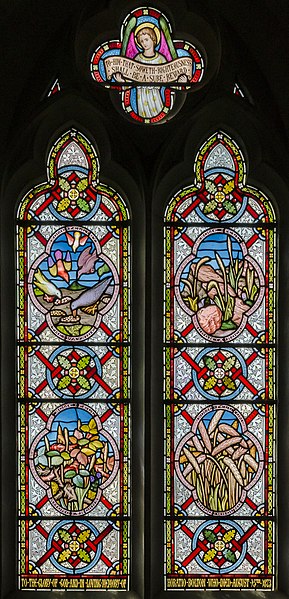
英国バーナム・ディープデールの聖マリア教会にあるステンドグラス
このような伝道に関する疑問や誘惑について考える中で、私たちは「種を蒔(ま)く人のたとえ」(マタイ13章)から戒められたり励まされたりしてきた。この有名な話の中でイエスは、聴衆だったパレスチナ人にとって親しみやすい例を用いた。
聖書学者のウィリアム・バークレーによると、当時の農夫が種蒔きに用いた方法には二つあった。手で蒔くか、それとも種を入れた穴あき袋をロバの背に結びつけ、ロバが畑を行ったり来たりする間に種を落としていくか。
[toggle]As we have processed these questions and temptations regarding evangelism, we have found ourselves both chastened and encouraged by the Parable of the Sower (Matt. 13). In this famous story, Jesus uses an analogy that would have been familiar to his Palestinian audience. According to Bible scholar William Barclay, farmers at the time would have sown their seed in one of two ways: either casting out the seed by hand or strapping a bag of seed to the back of a donkey, tearing a hole in the sack, and letting the seed spill out as the animal crossed the field. [/toggle]どちらの場合も、風が吹いたり、下が岩だったりすると、種は育たない。また、ここでは種を蒔く主体も分からない。人間かもしれないし、ロバかもしれないのだ。
ただ、どちらであっても、成長させてくださるのは神だ(1コリント3:7)。つまり、このたとえ話では、福音を伝える際にいる3人の「登場人物」──自分と聞き手と神を象徴しているのであり、その役割をきちんと理解しなければ、伝道の働きは、神が与えたよりもさらに難しく、負担の多いものになってしまう。
[toggle]In both scenarios, the seed would have been vulnerable to variables such as wind or rocky terrain, but because of these two different practices, the identity of the “sower” in this parable remains unclear. Perhaps we are the human sower, or perhaps we are the farmer’s donkey, but it is “God who gives the growth” (1 Cor. 3:7, ESV). In this way, the parable is symbolic of three “actors” who are present in the sharing of the gospel—you, the hearers, and God—and until we understand these roles properly, the work of evangelism will be much harder and more burdensome than God ever intended. [/toggle]自分の役割
[toggle]Your Role [/toggle]種を蒔く人は出て行って(マタイ13:3)、さまざまな種類の土地に種を蒔いた。しかし、この人のおかしなところは、種を手当たり次第に蒔いていることだ。悪い土地にも、良い土地にも蒔いている。この人は無謀だ。立ち止まって、「この種は根を張るだろうか」と考えもせず、ただすべての土地に機会を与えている。
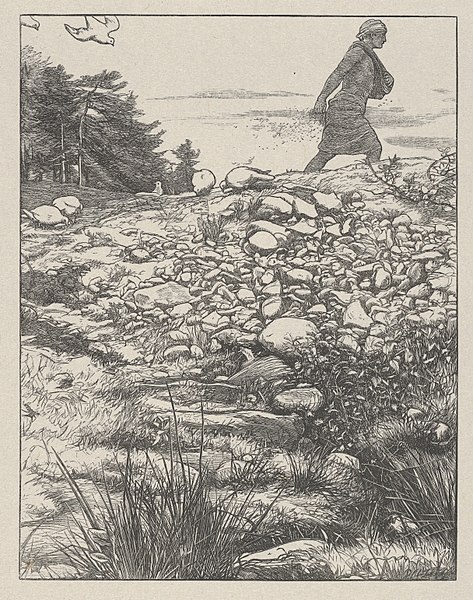
ジョン・エヴァレット・ミレー「種蒔く人」
イエスは、「あなたたちの役目も同じだ」と教える。私たちの役目は、その土地の質を見きわめることではなく、ただ種を蒔くことなのだと。
[toggle]In Matthew 13, the sower goes out to sow (v. 3), and he sows into all sorts of soil. What is strange about this sower, however, is that he sows haphazardly. He sows into bad soil and good. There is a recklessness to the sower. He does not pause to consider whether the seed can take root; he simply gives every soil the opportunity, and Jesus explains that our assignment is the same. It is not our role to judge the quality of the soil but simply to cast the seed. [/toggle]一方、この人の無謀さは、軽率さや浅はかさ、怠惰と混同すべきではない。良い農夫は耕したり、肥料を与えたりして土地を整えるが、このたとえにはそうした働きは描かれていない。
ただ、聖書全体には、土壌を整えることについての教えがあふれている。クリスチャンに対して熱心に勧められているのは、周りの土壌を耕して整えることだ。
[toggle]On the other hand, the sower’s “recklessness” should not be mistaken for carelessness, thoughtlessness, or laziness. In addition to sowing, a good farmer also cultivates his soil by loosening it and fertilizing it. The Parable of the Sower does not describe this work, but all of Scripture is brimming with instructions for cultivating the soil of our culture. When Christians are exhorted to “conduct yourselves with wisdom toward outsiders” (Col. 4:5, NASB), “keep your behavior excellent among the Gentiles” (1 Pet. 2:12, NASB), “speak up and judge fairly; defend the rights of the poor and needy” (Prov. 31:9), be known by your love (John 13:35), and be “all things to all people” (1 Cor. 9:22), these actions have a way of loosening and preparing the soil around us. [/toggle]「外部の人に対して賢くふるまいなさい」(コロサイ4:5)
「異教徒の間で立派に生活しなさい」(1ペトロ2:12)
「あなたの口を開いて正しく裁け、貧しく乏しい人の訴えを」(箴言31:9)
「互いに愛し合うならば、それによってあなたがたがわたしの弟子であることを、皆が知るようになる」(ヨハネ13:35)
「すべての人に対してすべてのものになりました」(1コリント9:22)
イエスの伝道活動のほとんども土壌を整える働きだった。姦通の現場で捕らえられた女を助け、「これからは、もう罪を犯してはならない」と教えた(ヨハネ8章)。またサマリアの女、つまり社会的に疎外されていた人に語りかけ、自分の町への伝道に派遣した(同4章)。そして、罪深い女にていねいに接し、自分の足に香油を塗ることを許し、「あなたの罪は赦された」と宣言した(ルカ7章)。
人を愛すること、癒やすこと、話を聞くこと、そして人々が理解できる言葉で語ることによって、イエスは豊かな土壌に種が落ちるよう準備した。「この世には聞く耳がない」とつい言ってしまう人にとって、このことは有益な軌道修正を促すだろう。
[toggle]Much of Jesus’ ministry work was soil work. He intervened on behalf of the woman caught in adultery before he exhorted her to sin no more (John 8). He reached out to the woman at the well, a social outcast, before dispatching her to evangelize her town (John 4). And he dignified the sinful woman, inviting her to anoint his feet and setting her free in forgiveness (Luke 7). By loving people, healing people, listening to people, and speaking in a language they could understand, he prepared the way for the seed to fall on fertile ground. For those of us who are prone to blame the world for its inability to hear, this perspective is a helpful corrective. [/toggle]聞く人の役割
[toggle]The Hearer’s Role [/toggle]ほかの人が回心することに、私たちは責任感を持ちすぎている。プライドがあるからにしろ、神への信頼に欠けているからにしろ、このたとえ話は私たちを正してくれる。R・T・フランスは注解書にこう書いている。「この四つの土壌の描写における焦点は、このたとえ話の目的のとおり、聞いたことを受け入れようとする意思の違いだ。全員が同じ言葉を聞いたからだ」
[toggle]For others of us, we place too much responsibility on ourselves to change hearts. Whether we do so because of pride or a lack of trust in God, this parable is a corrective for us also. In his commentary on Matthew, R. T. France writes, “The description of the four types [of soil] focuses, as surely as the parable intended, on their varying receptiveness to what they hear. All hear the same word.” [/toggle]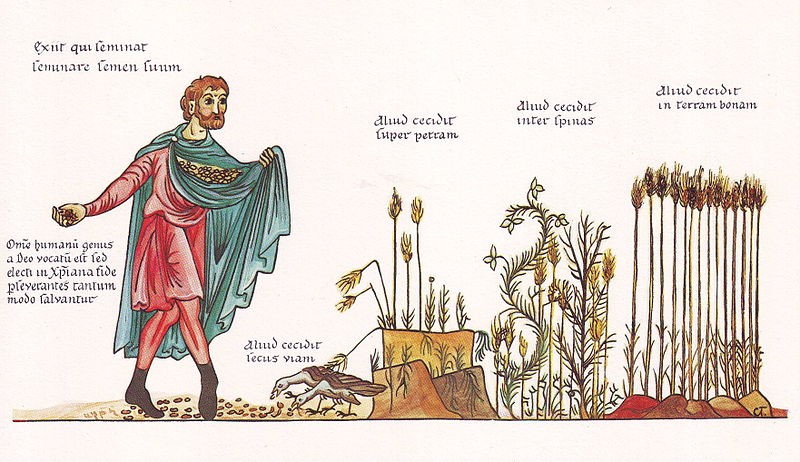
12世紀の百科事典『Hortus Deliciarum』に掲載されている「種を蒔く人のたとえ」のイラスト
イエスは、良い種であっても成長しづらい三つの土壌について話している。「道端」(マタイ13:4)、「石だらけで土の少ない所」(5節)、「茨の間」(7節)だ。
「道端」についてバークレーはこう説明する。そこは舗装された道のように固く、通行人の足で踏み固められている。これは、心が固く、見解が狭く、偏見によって神の言葉が聞き入れられない、教えることのできない魂、モラルのない性格、もしくは過去の経験で傷ついた人だ。
[toggle]Jesus describes three types of soil where even the best seed will struggle to grow: the hard path (Matt. 13:4), the rocky soil (v. 5), and the thorny ground (v. 7). The path, Barclay explains, would have been hard as pavement, packed down by the foot traffic of passersby, and it represents those hard-hearted and close-minded individuals who cannot receive the Word due to their prejudice, an unteachable spirit, an immoral character, or a wound from the past. [/toggle]「石だらけで土の少ない所」は、永遠に続くものを追い求めるのではなく、最新の流行を追いかけるような、信仰の浅い人のことだ。神学者のスタンリー・ハワーワスはこの手のクリスチャンを、「イエスに従うのが早すぎる人」と表現している。つまり、「どのような救い主なのかを理解することに欠けている」というのだ。どれほどの代償を払うかを考えていないので、彼らの信仰は簡単に道をそれて破滅に至る。
[toggle]The rocky soil represents a shallow faith, marked by chasing after the latest trend instead of cultivating something that lasts. Theologian Stanley Hauerwas describes this kind of Christian as one who is “too ready to follow Jesus,” meaning they “fail to understand that [they] do not understand what kind of Messiah this is.” They do not count the cost, and because of this, their faith is easily distracted or destroyed. [/toggle]「茨の間」は、フランスによると、土壌は良いが、「心配事や喜びに場所を取られている」。それが「楽をしたい」という誘惑でも、仕事に熱心になりすぎることでも、この種は他のことですでにいっぱいになっているので、丈夫に成長することができない。
[toggle]In the case of the thorny ground, the soil is good but “is already taken up” by what France calls “cares and delights.” Whether it is the temptation of ease or the busyness of over-commitment, this seed fails to grow and thrive because it is simply crowded out. [/toggle]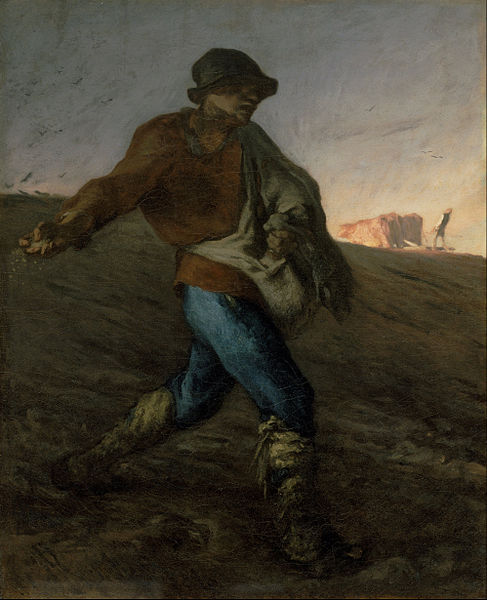
ジャン・フランソワ・ミレー「種蒔く人」
最後にイエスは、たった一つの、長期的に持続する成長を促す良い土壌について語る。神に心も思いも開かれていて、聞く準備ができ、理解しようと熱心で、その代償もいとわない人だ。
[toggle]Finally, Jesus describes the only good soil conducive to long-lasting growth. It is the heart and mind that is open to God, ready to hear, eager to understand, and willing to count the cost. [/toggle]このたとえ話で私たちは、何千ものさまざまな話や状況を代表するような4つの土壌と出会う。どんな時でも、どのような教会でも、女性の修養会でも、本屋でも、コーヒーショップでも、聞く側の土壌はさまざまな状況下にある。多くの人が、見た目と中身が違う。ある人は警戒しているし、ある人は「もっと聞きたい」と思っている。また、興味があるように見える人が実はそうでもなかったり、逆に受け入れたりする。
[toggle]In this parable, we encounter four different types of soil representing a thousand different stories and circumstances. At any given time, in any given church, women’s retreat, bookstore, or coffee shop, hearers are coming with their different states of soil. Many are not even what they appear. Some will be reserved yet more than ready to hear, while others seem curious but cannot, in actuality, be convinced. [/toggle]土壌の状態は、人が予想したり想像したりできないほどに多岐にわたっている。だからこそイエスは私たちに負担の少ない働きを与えたのだ。ただ、種を蒔くようにと。
あらゆる抵抗が待ち受けていると心配する必要はない。事実、このたとえ話は、ある種は根を張らないと約束しており、それでも私たちは種を蒔くようにと言われているのだ。
説き伏せられない人を説得するため、あらゆる種類のアクロバティックな聖書解釈をしたり、歪曲したり、曲解したりする必要はない。御言葉を説き明かす働きは神にゆだねられている。
[toggle]These soil conditions are too many for any one person to predict or imagine, which is why Jesus tasks us with a lighter burden: simply casting out seed. We do not have to anticipate every possible objection. In fact, this parable promises that some of our seed will not take root, and we are expected to cast it out anyway. We do not have to bend or twist or perform all sorts of acrobatic interpretive work to persuade the unpersuadable. That work is up to God. [/toggle]聖霊の役割
[toggle]The Spirit’s Role [/toggle]園芸のほとんどは、人間のコントロールの埒外(らちがい)にある。自然の要素をコントロールすることはできない。風も、干ばつも、洪水も、疫病もコントロールできない。御言葉の種を蒔くのも同じだ。私たちにはコントロールできないことが多い。
使徒パウロは種まきの働きについて、大切な所見を述べている。彼は伝道の大切さを訴え、執拗(しつよう)なまでに種を蒔いたが、こう書いているのだ。「わたしは植え、アポロは水を注いだ。しかし、成長させてくださったのは神です」(1コリント3:6)
[toggle]So much of horticulture is outside of human control. We cannot control the elements. We cannot control the wind, the drought, the floods, or the pests. Sowing the Word of God is similar—there is much we cannot control. In 1 Corinthians 3:6, the apostle Paul makes an important observation about the work of sowing. He affirms the value of evangelism, and he doggedly casts out seed, but he also writes, “I planted the seed, Apollos watered it, but God has been making it grow.” [/toggle]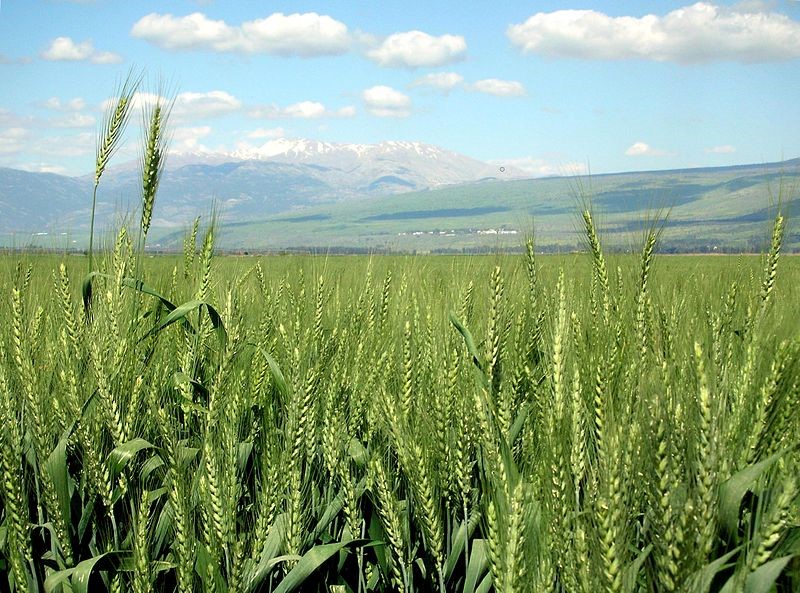
イスラエルの小麦畑(写真:H20)
伝道において、私たちの役割は重要だ。しかし、私たちの役割は限られている。この真実が私たちの荷を軽くする。人々を説き伏せなくてはならないというプレッシャーを感じた時や、福音を口当たりのよいものに変えたいという誘惑に駆られた時には、「救いは聖霊の働きだ」と思い出すべきだ。聖霊は私たちの言葉を用いて、ほかの人の心に合ったかたちに変えてくださる。私たちが特定のシチュエーションでのメッセージを語っても、聖霊はそれを、無数の異なる人生のシナリオに当てはまるものへと翻訳してくださる。
[toggle]When it comes to evangelism, our role matters—but our role is also limited, and this truth can unburden us. Whenever we feel the pressure to convince people or feel tempted to make our gospel “nicer,” we are wise to remember that salvation is the Spirit’s work. The Spirit can take our words and make them just the right shape for another’s heart. The Spirit can translate our message about one situation into a myriad of different life scenarios. [/toggle]もし、ある人の心の固い土壌を耕そうとしているのなら、それは聖霊の働きだ。もし石や茨を取り除こうとしているなら、それも聖霊の働きだ。私たちは種を蒔くことはできるが、それ以外の重労働は聖霊に任せられているのだ。私たちは、聞く人の顔色を見てメッセージを変質させてはならない。むしろ、聖霊が彼を変えてくださると信頼するのだ。
[toggle]If anyone is going to break up the hard soil of a person’s heart, it is going to be the Spirit of God. If anyone is going to clear away the rocks and the thorns, it is going to be the Spirit of God. We may cast out the seed, but it is the Spirit who does all the heavy lifting. We do not have to transform the message for the benefit of hearers; instead we trust the Spirit to transform them. [/toggle]伝道は確かな働き
[toggle]Evangelism’s One Sure Thing [/toggle]伝道すると、その人に「決心してほしい」という願いとの葛藤が生まれる。私たちはつい自分たちが思うような結果を望んでしまうが、伝道にそんな約束はない。「種を蒔く人のたとえ」には、イエスがそうであるように、曖昧(あいまい)さがある。私たちの救い主は、御言葉の種を蒔くだけでなく、命の種も蒔いているからだ。
[toggle]Evangelism challenges our desire for resolution. We often want results we can point to—and faithful evangelism cannot promise us this. The Parable of the Sower meets us in this ambiguity, as does Jesus himself. Not only does our Savior cast out the seed of his words, but he also casts out the seed of his life. [/toggle]伝道へのアプローチには、御言葉の種を蒔くことを無視するものもあれば、命の種を蒔くことを無視するものもある。しかし、イエスに従う者として、私たちはどちらもするようにと召されている。私たちは真実のすべてを大胆に語ることによって、また愛をもって命を投げ出すことによって種を蒔く。どちらも、聞く人が応答するかどうかは保証されていないが、一つだけ確かなことがある。それは、できるだけ多くの人に与えることによって、来るべき神の御国を垣間見ることができるということだ。
[toggle]It strikes me that some approaches to evangelism neglect the sowing of our words, while others neglect the sowing of our lives. But, as Jesus’ followers, we are called to follow him in both. We sow by speaking the whole truth with boldness and by laying our lives down in love. Neither guarantees a response in our hearers’ lives, but they do guarantee one thing: granting as many people as possible a glimpse of the coming kingdom of God. [/toggle]執筆者のシャロン・ホッデ・ミラーは『ナイス──なぜ好かれたいと思うのか。どうして神は私たちを求め、私たちを自由にさせたいのか』の著者。女性と召命に関する博士号を取得し、ノースカロライナ州ダーハンのブライト・シティー教会を夫アイクと共に指導している。
Sharon Hodde Miller is the author of Nice: Why We Love to Be Liked and How God Calls Us to More and Free of Me (Baker Books). She holds a PhD on the topic of women and calling, and she leads Bright City Church in Durham, North Carolina, with her husband, Ike. [/toggle]
本記事は「クリスチャニティー・トゥデイ」(米国)より翻訳、転載しました。翻訳にあたって、多少の省略をしています。
出典URL:https://www.christianitytoday.com/women/2019/october/evangelism-isnt-about-results.html
